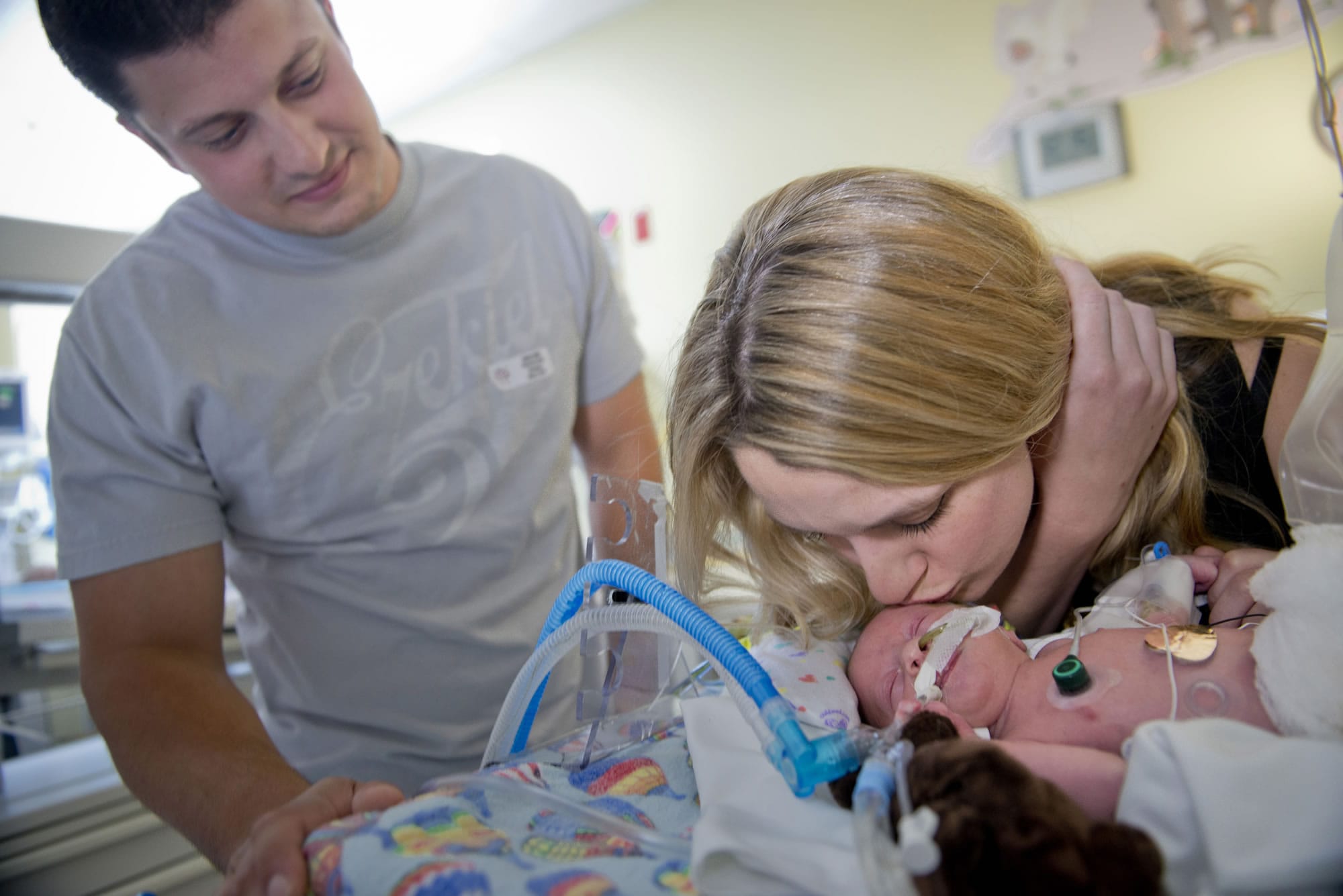For more stories, blogs and information on nutrition, fitness, health and advice on how to be healthier, visit columbian.com/livewell.
SACRAMENTO, Calif. — Little Carter Silveira was sound asleep in the Sutter Memorial Hospital neonatal intensive care unit.
A ventilator helped him breathe. Sensors on his chest monitored his temperature, and fine tubes snaked into a foot and his left arm and hand. Most alarming, a bundle of gauze covered his abdomen, evidence of the two life-saving surgeries he has endured, the first only moments after his premature birth on May 4.
Carter was born with his intestines outside his body, a condition called gastroschisis. His prognosis is good, but it was still hard on his mother to spend her first Mother’s Day in the NICU, unable even to pick up her baby.
“I want to see my mom on Mother’s Day, but I want to spend as much time as I can with the baby here, too,” said Annie Bollinger, 32, a recent nursing school graduate who lives in Sacramento, Calif. “Just seeing the baby’s face when he came out, my life changed instantly.”
Hushed and dimly lit, the region’s five advanced level NICUs are an especially poignant setting for first-time mothers such as Bollinger.
Like so many new parents, she and Carter’s father, Nick Silveira, hope that their newborn thrives for many decades to come. But NICU parents also pray simply for the miracle that medicine has made routine: the survival of desperately ill babies who struggle against steep odds posed by early delivery, genetic conditions and birth defects.
Teams of neonatal specialists regularly save the lives of babies born much smaller, earlier and sicker than Carter Silveira, who weighed five pounds, two ounces and was born when Bollinger was not quite 37 weeks pregnant.
Although a normal pregnancy lasts 39 weeks, the National Center for Health Statistics says that more than 12 percent of live births involve pre-term babies — about half a million every year, or one in every nine American births. About 2 percent of these early deliveries occur at less than 32 weeks’ gestation.
Causes of premature birth can include carrying multiples, lack of prenatal care and smoking. Experts say that half the time, no risk factor is known.
Today, 90 percent of babies born at 26 weeks survive, as do about half of those born at 24 weeks, Centers for Disease Control figures show. So do half of micro-preemies, or babies weighing one pound, 12 ounces or less at birth.
Only a few decades ago, the situation was dramatically different.
“In 1980, when I graduated from medical school, if a baby was less than two pounds at birth, the chances of survival were minimal,” said Dr. Robin Steinhorn, head of the University of California-Davis Medical Center pediatrics department.
“Now the chances are that the baby will be discharged doing very well, with a healthy life expectancy. What we’re able to do in NICU now was just a dream back then. The advances have been extraordinary.”
First, she says, doctors realized that premature babies have different health needs than babies carried to term. Preemies’ skin is tissue-thin and delicate. Their intestines sometimes aren’t able to absorb nutrients. Sometimes, these newborns are simply too young to know how to suckle.
And tiny preemies’ lungs typically haven’t developed fully, often not producing pulmonary surfactant, the milky protein lining that coats the lungs and makes breathing possible.
The science of the NICU began with the development of an artificial substitute for surfactant — an advance, said Steinhorn, that transformed the field.
Then came the development of a special breathing apparatus, which looks like a miniature scuba mask, to support undeveloped lungs without damaging them, as well as the development of intravenous feeding for babies whose bowels aren’t mature enough to absorb nutrients. The increasing use of microsurgery, using microscopic lenses, has led to advances in the repair of newborns’ birth defects.
“There’s a whole care team now and a science in the NICU,” said Steinhorn. “How much oxygen do we give? How much breathing support? We measure every drop of fluid we give. Every drop of medicine is titrated down to the microgram.
“And every year we see more babies surviving with normal life expectancy. They’re on the playground doing everything you’d dream of for children.”
Not all NICU stories have a happy ending: Even if small and sick babies survive, experts know that all don’t thrive. That’s the dark side of the statistics.
“You can calculate survival at 23 weeks, but intact survival, without major neurological impairment, is smaller,” said Dr. Bill Gilbert, medical director of Sutter Women’s Services and a high-risk pregnancy specialist.
Long-term complications can include cerebral palsy, chronic lung disease and vision loss.
“It’s a long process,” said Gilbert. “You can’t look too far ahead.”
Several decades ago, babies born with gastroschisis — such as little Carter Silveira — were unlikely to survive, but today, NICU specialists consider the condition fairly easy to treat.
“One doctor told us, ‘You guys are pretty boring,'” said Nick Silveira, 26, a carpenter.
“And we were fine with that,” said Bollinger.
Their little boy will likely spend a few more weeks in the NICU, healing from his surgeries and growing stronger.
“I didn’t think he’d be home for Mother’s Day,” said Bollinger. “I knew he’d be in the hospital. It’s surreal, but I’m really excited.
“We feel a whole new responsibility now. Our world has changed.”



